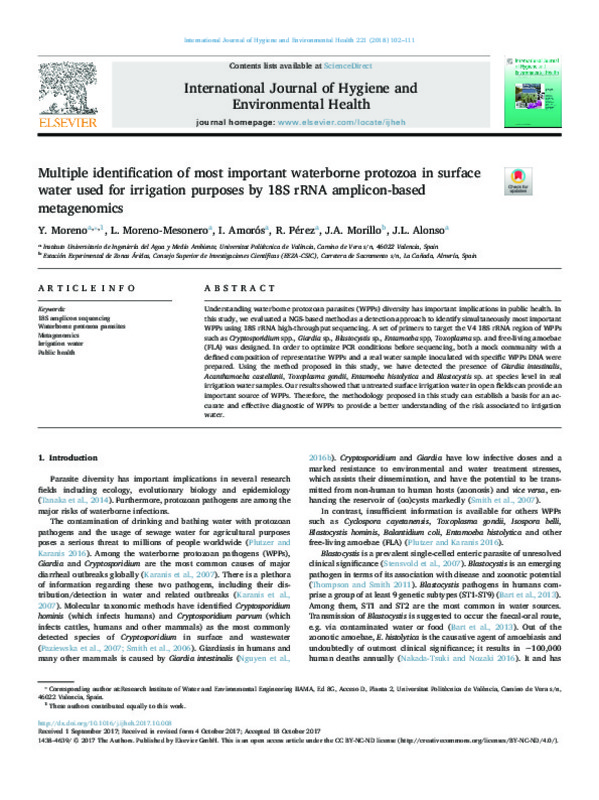JavaScript is disabled for your browser. Some features of this site may not work without it.
Buscar en RiuNet
Listar
Mi cuenta
Estadísticas
Ayuda RiuNet
Admin. UPV
Multiple identification of most important waterborne protozoa in surface water used for irrigation purposes by 18S rRNA amplicon-based metagenomics
Mostrar el registro sencillo del ítem
Ficheros en el ítem
| dc.contributor.author | Moreno Trigos, Mª Yolanda
|
es_ES |
| dc.contributor.author | Moreno-Mesonero, Laura
|
es_ES |
| dc.contributor.author | Amoros, Inmaculada
|
es_ES |
| dc.contributor.author | Pérez-Santonja, Rut
|
es_ES |
| dc.contributor.author | Morillo, J.A.
|
es_ES |
| dc.contributor.author | Alonso Molina, José Luís
|
es_ES |
| dc.date.accessioned | 2019-02-20T21:03:30Z | |
| dc.date.available | 2019-02-20T21:03:30Z | |
| dc.date.issued | 2018 | es_ES |
| dc.identifier.issn | 1438-4639 | es_ES |
| dc.identifier.uri | http://hdl.handle.net/10251/117015 | |
| dc.description.abstract | [EN] Understanding waterborne protozoan parasites (WPPs) diversity has important implications in public health. In this study, we evaluated a NGS-based method as a detection approach to identify simultaneously most important WPPs using 18S rRNA high-throughput sequencing. A set of primers to target the V4 18S rRNA region of WPPs such as Cryptosporidium spp., Giardia sp., Blastocystis sp., Entamoeba spp, Toxoplasma sp. and free-living amoebae (FLA) was designed. In order to optimize PCR conditions before sequencing, both a mock community with a defined composition of representative WPPs and a real water sample inoculated with specific WPPs DNA were prepared. Using the method proposed in this study, we have detected the presence of Giardia intestinalis, Acanthamoeba castellanii, Toxoplasma gondii, Entamoeba histolytica and Blastocystis sp. at species level in real irrigation water samples. Our results showed that untreated surface irrigation water in open fields can provide an important source of WPPs. Therefore, the methodology proposed in this study can establish a basis for an accurate and effective diagnostic of WPPs to provide a better understanding of the risk associated to irrigation water. | es_ES |
| dc.description.sponsorship | This work was supported through the project funded by the Spanish Ministry of Economy and Competitiveness (MINECO) in the frame of the collaborative international consortium JPIW2013-095-C03-02 of the Water Challenges for a Changing World Joint Programming Initiative (Water JPI) Pilot Call. R. Perez acknowledges support from MINECO program "Promocion de Empleo Joven e Implantacion de la Garantia Juvenil en I + D + i". | |
| dc.language | Inglés | es_ES |
| dc.publisher | Elsevier | es_ES |
| dc.relation.ispartof | International Journal of Hygiene and Environmental Health | es_ES |
| dc.rights | Reconocimiento - No comercial - Sin obra derivada (by-nc-nd) | es_ES |
| dc.subject | 18S amplicon sequencing | es_ES |
| dc.subject | Waterborne protozoa parasites | es_ES |
| dc.subject | Metagenomics | es_ES |
| dc.subject | Irrigation water | es_ES |
| dc.subject | Public health | es_ES |
| dc.subject.classification | MICROBIOLOGIA | es_ES |
| dc.title | Multiple identification of most important waterborne protozoa in surface water used for irrigation purposes by 18S rRNA amplicon-based metagenomics | es_ES |
| dc.type | Artículo | es_ES |
| dc.identifier.doi | 10.1016/j.ijheh.2017.10.008 | es_ES |
| dc.relation.projectID | info:eu-repo/grantAgreement/MINECO//JPIW2013-095-C03-02/ES/NUEVOS INSTRUMENTOS MOLECULARES Y DE METAGENOMICA PARA LA IDENTIFICACION Y CONTROL A ESCALA EUROPEA DE CONTAMINANTES MICROBIANOS EMERGENTES EN AGUA DE RIEGO/ | es_ES |
| dc.rights.accessRights | Abierto | es_ES |
| dc.contributor.affiliation | Universitat Politècnica de València. Instituto Universitario de Ingeniería del Agua y del Medio Ambiente - Institut Universitari d'Enginyeria de l'Aigua i Medi Ambient | es_ES |
| dc.description.bibliographicCitation | Moreno Trigos, MY.; Moreno-Mesonero, L.; Amoros, I.; Pérez-Santonja, R.; Morillo, J.; Alonso Molina, JL. (2018). Multiple identification of most important waterborne protozoa in surface water used for irrigation purposes by 18S rRNA amplicon-based metagenomics. International Journal of Hygiene and Environmental Health. 221(1):102-111. https://doi.org/10.1016/j.ijheh.2017.10.008 | es_ES |
| dc.description.accrualMethod | S | es_ES |
| dc.relation.publisherversion | http://doi.org/10.1016/j.ijheh.2017.10.008 | es_ES |
| dc.description.upvformatpinicio | 102 | es_ES |
| dc.description.upvformatpfin | 111 | es_ES |
| dc.type.version | info:eu-repo/semantics/publishedVersion | es_ES |
| dc.description.volume | 221 | es_ES |
| dc.description.issue | 1 | es_ES |
| dc.identifier.pmid | 29066287 | |
| dc.relation.pasarela | S\347878 | es_ES |
| dc.contributor.funder | Ministerio de Economía, Industria y Competitividad | es_ES |








